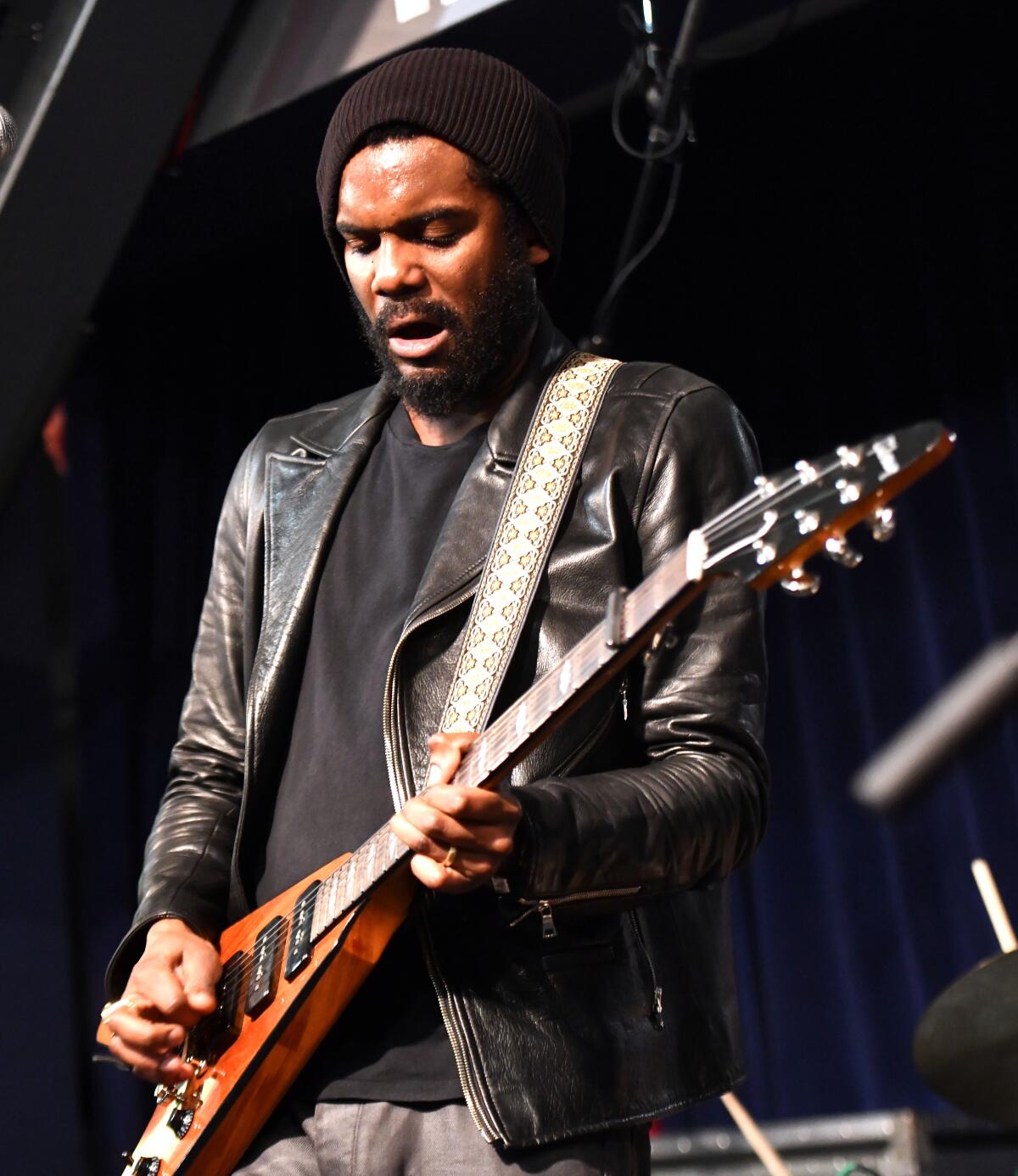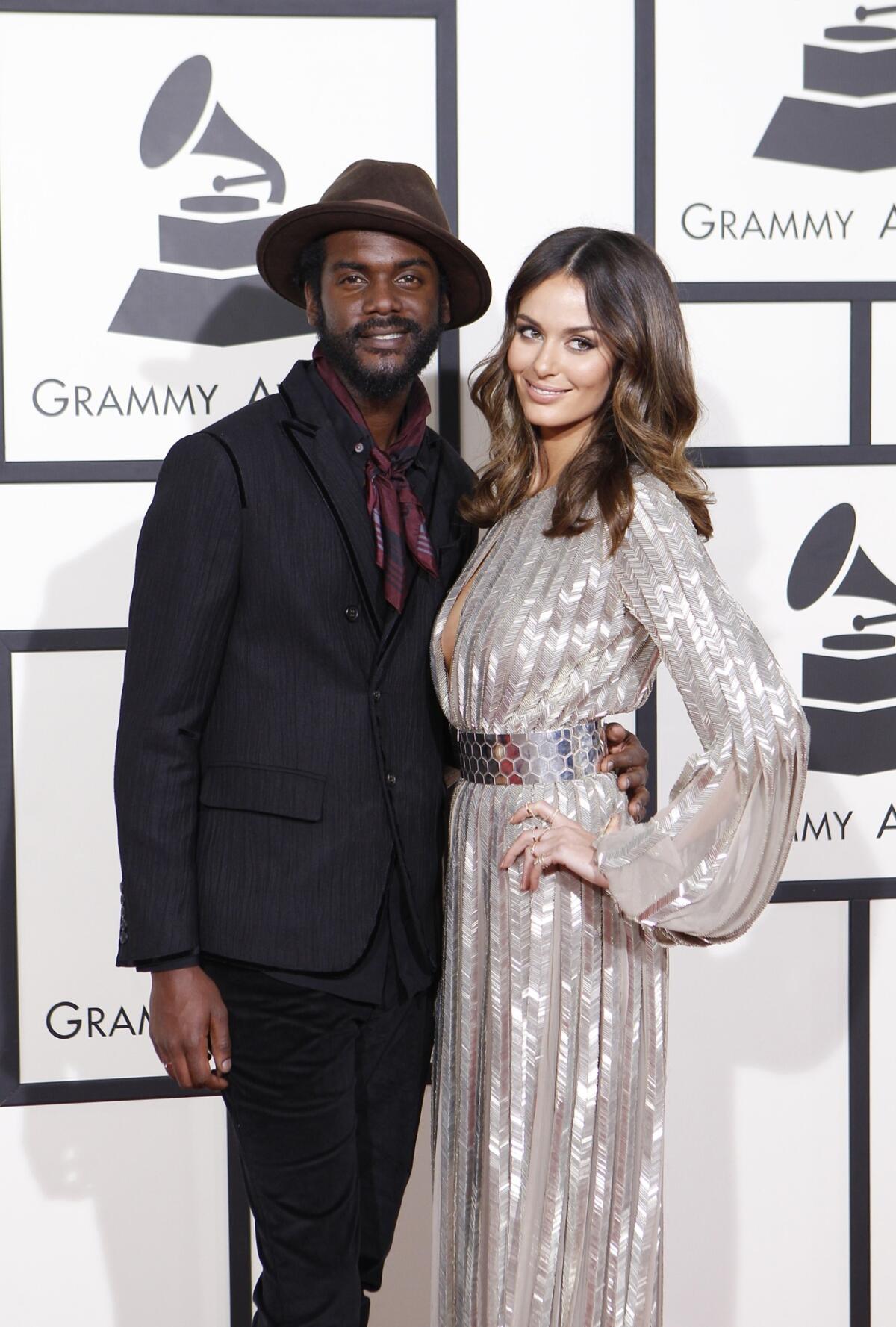Yes, Gary Clark Jr. is a throwback guitar god. But he’s no ‘museum piece’
- Share via
There was a viral video going around this month that got the attention of Texas guitar hero Gary Clark Jr. The clip captured a moment of innocence in an unnamed American city as a pair of toddler boys, one black and one white, recognized each other on the sidewalk and ran into a brotherly embrace.
“That’s what life is like before the old ways start to infiltrate their lives,” says Clark, 35, who grew up in Austin, with his own memories of casual racial slurs and worse, as a young African American in central Texas.
Protest and social justice haven’t previously been the central focus of Clark’s songs, with a few notable exceptions on his first two studio releases for Warner Records. He’s been celebrated mainly as a next-generation master of molten blues guitar and a new hope for old ways in the digital era, but his latest album, “This Land,” begins with a title song of genuine anger and deep, raging funk.
“Right in the middle of Trump Country ... I see you looking out your window,” he sings, outraged and practically taunting a race-baiting neighbor named “Mr. Williams” amid blasts of organ and guitar. “Can’t wait to call the police on me.”

The words were inspired by a real incident outside his 50-acre ranch near Austin, where a white neighbor asked to speak with the owner, not believing that a black man could possibly afford to own the property. Clark’s 3-year-old son witnessed their heated confrontation.
“I kind of stay in my lane — I’m quiet. I’ve always had songs of protest, but nothing so blatant,” says Clark, who points to vintage outspoken songs by Big Bill Broonzy, Lead Belly and Woody Guthrie as inspiration. “It’s just been in the news. I wanted to express my take on it.”
In interviews, Clark tends to be laid back and welcoming, a sharply dressed but unpretentious rocker of few words. But as he spoke recently from a tour stop in Seattle, he was in an especially talkative mood, reemphasizing the message of “This Land” and his means of expressing it.
“I’m surrounded by more love and positivity than I am negative. But [racism] has also had an impact on my life and on the way that I see things.”
The explosive song was the last written and recorded for the album. For Clark, who headlines the Hollywood Bowl this Sunday, it was just part of an evolving statement of purpose as a musician and a claim on the present. Across many of its 16 songs, the guitarist strays far beyond blues nostalgia and samples a variety of sounds and styles, from folk to reggae to punk, fusing them into something of his own.
“What About Us” is seething, swaggering funk in the Sly Stone tradition, taking on his “Mr. Williams” again with a message on evolving America: “You can call it what you want, but the young bloods taking over / Don’t get too comfortable, just plan on moving over.”
In recent years, Clark has collaborated on records by Alicia Keys, Childish Gambino and Tech N9ne, suggesting other paths for him to explore. “Blues, gospel, folk, country, that’s American music,” he says. “That’s where we come from. I know the past, but I want to be a part of the future too. I don’t want to be a museum piece.”
“This Land,” a leading rock contender for Grammy recognition this season, earned accolades from critics at Pitchfork and the New York Times alike. It debuted at No. 6 on the Billboard Top 200 chart, matching the performance of his 2012 major-label debut, “Blak and Blu.”
Clark is a major draw on the road and in 2019 had stops at Lollapalooza and Red Rocks without the fuel of a large radio presence. At Warner, his A&R guru Lenny Waronker helped sign the guitarist following a 2010 career-making performance at Eric Clapton’s Crossroads Festival in Chicago and now commends Clark’s growth as a songwriter and recording artist.
“He could have a rock hit, a pop hit, an alternative pop hit, R&B,” Waronker says of Clark’s “cinematic” range as a potential hit-maker. A longtime top record executive, Waronker believes that guitar-based music will continue to find a place in the hip-hop-driven streaming era. “I don’t think anything that’s great goes away. It may have a pause in time, but when somebody has such facility and knows how to weave it into different genres, anything’s possible.”
On stage, Clark stands tall beneath a wide-brimmed hat, a soft-spoken gunslinger who lets his music do the shouting, as he unfurls a lava flow of melody and muscle on electric guitar. He’s been touring with the same lineup of complementary musicians since 2011 but prefers to do much of the playing by himself in the studio.
Back in July, Clark performed at a Texas-style BBQ for an industry crowd at Henson Studios in Hollywood to share a bit of his hometown culture, promote his Grammy prospects and take “an opportunity to force my songs down people’s throat who might not necessarily want to listen.” His wife, model Nicole Trunfio, was there with their two small children and pregnant with their third, and a trio of Texas state flags decorated a building near the stage.

Clark was an Austin teenage phenomenon embraced by the blues and rock community of the renowned local nightclub Antone’s and beginning to draw outsize attention. He grew up in nearby suburbia, the son of a car salesman father and accountant mother, where the soundtrack in constant rotation included the Temptations, Marvin Gaye, Stevie Wonder and Dionne Warwick.
That influence can be heard in the Prince-flavored “Pearl Cadillac,” a warm tribute to his mother, and the deep classic soul of “Feed the Babies,” weaving brass, organ and guitar with Clark’s aching falsetto.
“This Land,” recorded in Austin (with co-producer Jacob Sciba) instead of Los Angeles or New York, was designed to return him to a time of excitement and innocence, destination unknown.
“I wanted to be at home with people that I trust and make music the way I used to make it, when I was a 15-year-old in the garage,” Clark says. “That’s what gave me the most happiness, the most freedom.”
As Clark heads to the Bowl this weekend for his biggest Los Angeles headline show yet, the comparisons to Jimi Hendrix and Stevie Ray Vaughan will continue, just as long as he wields his guitar so skillfully. “Yeah, the blues is my foundation,” he says, “but that’s just because you’ve got to know your history before you can figure out where you’re trying to go.”
Gary Clark Jr. with Michael Kiwanuka
Where: Hollywood Bowl, 2301 N. Highland Ave.
When: 7 p.m. Sept. 29
Tickets: $24-$128
Info: (323) 850-2000, hollywoodbowl.com
More to Read
The biggest entertainment stories
Get our big stories about Hollywood, film, television, music, arts, culture and more right in your inbox as soon as they publish.
You may occasionally receive promotional content from the Los Angeles Times.










